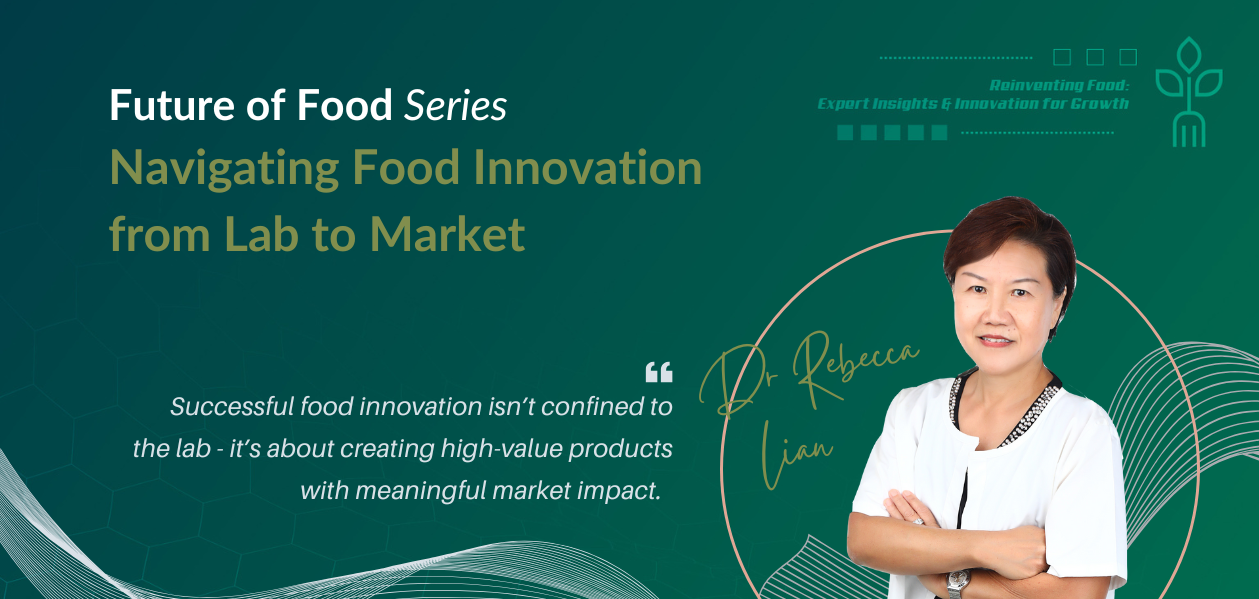IPI Innovation Advisor Dr Rebecca Lian highlights how Singapore’s food SMEs can effectively overcome product development and market expansion challenges by leveraging external expertise, rigorous validation and open innovation.
For SMEs looking at how to expand their food business in Singapore’s food industry, innovation is essential. But turning promising ideas into commercially viable products can be challenging. Many SMEs lack in-house food-science expertise, while others find it difficult to translate laboratory research into market-ready solutions.
Dr Rebecca Lian, IPI Innovation Advisor and Chief Technology Officer at Green Planet Foods, understands these obstacles well. With nearly four decades of experience leading R&D at Nestlé and Wilmar International, Dr Lian now helps SMEs expand their food business by bridging the gap between promising innovations and successful commercialisation.
Capitalise on trends and move fast
Consumer preferences in Singapore and the region are constantly evolving, driven by growing demand for healthier, minimally processed foods. Across the region, businesses are considering trends like personalised nutrition, clean labels and products targeted at senior consumers.
“Consumers today look for nutritious food that’s easy to prepare yet offers restaurant-quality flavours,” Dr Lian added. “There is also rising interest in affordable, protein-rich and fibre-rich products with reduced fat and sugar.”
For SMEs, these trends are laden with valuable opportunities. “To seize them, SMEs must clearly define their product concept, validate it thoroughly with target consumers and deliver on taste at the right price,” said Dr Lian. “Getting this right can unlock local, regional and global markets, especially among young, urbanised consumers.”
Even the most promising food innovations can stumble without rigorous validation. To avoid these pitfalls, technical precision is key. “The science behind a concept must be robust enough to protect product integrity, meet food safety standards and deliver consistent nutritional value,” Dr Lian explained. “Even packaging choices should balance environmental sustainability with practical durability through the supply chain.”
In particular, SMEs frequently struggle with aligning innovative concepts developed in research institutions with real-world market applications. High production costs can also be a stumbling block. These challenges may impede viable ideas from reaching commercial scale—limiting an SME’s growth.
Tap into the power of open innovation
Embracing open innovation is one way to overcome these barriers. The complexities involved in food product development make external expertise, partnerships and collaborations essential.
“Open innovation allows SMEs to validate their concepts, technologies and packaging more efficiently,” said Dr Lian. “It also provides critical insights into consumer communication, ensuring that the final product resonates strongly with its intended market.”
Indeed, drawing on external expertise can dramatically shorten the path from idea to market. One successful example of how food innovation can translate into real business outcomes is seen in Dr Lian’s advisory work with Lek Lim Nonya Kueh, a third-generation family business that offers traditional kueh.
Looking ahead towards expansion, Lek Lim Nonya Kueh worked with two IPI Innovation Advisors, Dr Rebecca Lian to improve work processes and production, as well as Dr Ong Mei Horng to identify the right manufacturing software and improve traceability. Applying her expertise, Dr Lian successfully reformulated their product to make production easier and alleviate the capacity constraints they were facing.
The team was then able to move on from traditional mixing used by the company’s founders over 40 years ago, to a simple machine process. Additionally, with this new process, Lek Lim Nonya Kueh was able to form and freeze their products with ease.
Throughout the process, the Lek Lim Nonya Kueh team was consistently open to listening and working with Dr Lian—a trait that allowed a more effective transition.
“SME leaders should approach external collaborations with openness and clarity. Expert advisors provide critical guidance, but SMEs must understand their role: they carry out the hands-on work based on this strategic guidance. IPI advisors are there to complement and strengthen SME capabilities, not replace them,” added Dr Lian.
SMEs looking to surmount the complexities of food innovation can greatly benefit from IPI’s network of advisors and resources. Through expert guidance, SMEs can refine concepts, address technical challenges and make informed decisions that significantly reduce risks and costs.
“Successful food innovation in Singapore isn’t confined to the laboratory. It’s always about creating differentiated or high-value products with meaningful market impact,” adds Dr Lian. “With targeted external support, SMEs can more effectively bring their concepts to consumers, driving both growth and sustainability.”

